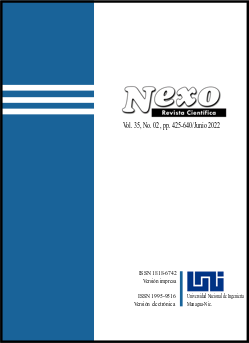Different concepts of supply chain sustainability: an approach on circular supply chai
DOI:
https://doi.org/10.5377/nexo.v35i02.14642Keywords:
Supply chain, Sustainability, Green supply chain, Closed-loop supply chain, Circular supply chain, Circular economyAbstract
There are many overlaps between sustainability concepts so they are sometimes used interchangeably. This study was aimed to provide a deep analysis of the sustainability concepts in the circular supply chain (CSC) field and to identify research gaps and paths for future research. We conducted a search using keywords including “sustainability” combined with at least one of the keywords sustainable supply chain, green supply chain, circular supply chain, and closed-loop supply chain in the Google Scholar, ScienceDirect, and Emerald as well as the Web of Science. Mind Map Software was used to identify the gaps in the use of the CSC. The comparative investigation of the different concepts of sustainability showed that the CSC encompasses all concepts of sustainability and has a comprehensive concept that goes beyond all concepts of sustainability.
Downloads
1845
Downloads
Published
How to Cite
Issue
Section
License
Copyright (c) 2022 Universidad Nacional de Ingeniería

This work is licensed under a Creative Commons Attribution 4.0 International License.
The authors who publish in Nexo Scientific Journal agree to the following terms:
- Authors retain the copyright and grant the journal the right of the first publication under the license Creative Commons Attribution License, which allows others to share the work with a recognition of the authorship of the work and the initial publication in Nexo Scientific Journal.
- Authors may separately establish additional agreements for the non-exclusive distribution of the version of the work published in the journal (for example, in an institutional repository or a book), with the recognition of the initial publication in Nexo Scientific Journal.
- Authors are allowed and encouraged to disseminate their works electronically (for example, in institutional repositories or in their own website) before and during the submission process, as it can lead to productive exchanges, as well as earlier and greater citation of published works.










